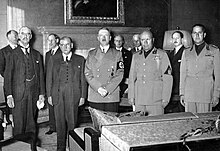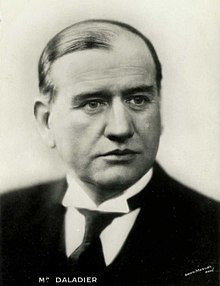Edouard Daladier

Édouard Daladier (born June 18, 1884 in Carpentras , Département Vaucluse , † October 10, 1970 in Paris ) was a French politician ( Parti Radical Socialiste ). During the 1930s, Daladier was Prime Minister several times and pursued a policy of appeasement towards the National Socialist German Reich .
Life
Édouard Daladier was the son of a baker. He taught history at the Lycée Thiers in Marseille and became a member of the Parti Radical Socialiste . When he was elected mayor ( Maire ) of his hometown Carpentras in 1911 he entered politics. During the First World War fought Daladier on the Western Front, and was in the war Lieutenant ( Lieutenant ).
After the First World War
In 1919, Daladier was elected to the Chamber of Deputies ( Chambre des députés ) for the Vaucluse department and held the mandate until 1940. As a member of parliament he belonged to the left wing of his party and received political support from Prime Minister Édouard Herriot . In his first government (June 14, 1924 to April 10, 1925) Daladier took over a cabinet post for the first time and became Minister of Colonial Affairs . Between 1927 and 1932 he was chairman of his party and was largely responsible for the break with the Socialist Party SFIO in 1926 and the Conservative Prime Minister Raymond Poincaré in November 1928.
From October 1925 to January 1933 he was a ministerial post for a total of seven months.
From 1933 to 1940 he was Prime Minister of a center-left coalition five times (January to October 1933, nine days in January and February 1934, until he had to resign after the unrest of February 6, 1934 , April 12, 1938 to March 20 1940). During the Popular Front government under the socialist Léon Blum (Cabinets Blum I and II) he was Minister of War. Daladier's governments were often dependent on the toleration or support of changing political camps, and he himself had to change course a few times.
In 1938 he took over the British appeasement policy and, together with Arthur Neville Chamberlain, played a major role in the creation of the Munich Agreement , which in the course of the Sudeten crisis resulted in the cession of the Sudeten German territories to the German Reich . After the Sudeten crisis, he drove the long-neglected rearmament of France. On September 3, 1939, after Hitler's attack on Poland on September 1, 1939, Daladier declared the war he had wanted to avoid on the German Reich in accordance with the British-French declaration of guarantee against Poland. In March 1940, Daladier resigned as prime minister because he had denied democratic Finland the publicly requested aid during the winter war against the Soviet Union. Paul Reynaud became his successor. Daladier himself became Minister of War and Foreign Minister in the last days before the defeat by Germany. After the Blitzkrieg of the German Wehrmacht against France, Daladier fled to Morocco , but was captured and indicted by the Vichy regime in the fall of 1941, together with Léon Blum, for treason in the Riom trial. The trial was dragged off by the French judiciary and discontinued in 1943 on German orders.
In 1943, Daladier was deported to Germany by the occupying power together with the former President Albert Lebrun and interned with other French at Itter Castle near Wörgl in Tyrol . On May 5, 1945, those imprisoned there were liberated by deserted soldiers of the Wehrmacht and the American army in action against the Waffen-SS at the Battle of Itter Castle .
After the Second World War
Daladier was re-elected MP from 1946 to 1958 and, as a strong figure in the Parti Radical, was one of de Gaulle's opponents during the Fourth Republic . From 1956 he was parliamentary group leader of his party in the National Assembly . In 1958, he opposed a majority vote in parliament to authorize General Charles de Gaulle, appointed by President René Coty to head the government, to draft a new constitution. Daladier was honorary chairman of his party, which split into two wings in the Fifth Republic , the left of which formed an alliance with the socialists Parti socialiste français as the MRG ( Mouvement des Radicaux de Gauche ) . From 1953 to 1958 he was mayor of Avignon .
Web links
- Literature by and about Édouard Daladier in the catalog of the German National Library
- Newspaper article about Édouard Daladier in the press kit of the 20th century of the ZBW - Leibniz Information Center for Economics .
- Manfred Wichmann: Édouard Daladier. Tabular curriculum vitae in the LeMO ( DHM and HdG )
| predecessor | Office | successor |
|---|---|---|
|
Joseph Paul-Boncour Camille Chautemps Léon Blum |
Prime Minister of France January 31, 1933-24. October 1933 January 30, 1934–9. February 1934 April 10, 1938 - March 21, 1940 |
Albert Sarraut Gaston Doumergue Paul Reynaud |
|
Joseph Paul-Boncour Georges Bonnet Paul Reynaud |
Foreign Minister of France January 30, 1934–9. February 1934 September 13, 1939-21. March 1940 May 18, 1940 - June 5, 1940 |
Louis Barthou Paul Reynaud Paul Reynaud |
|
Yvon Delbos Bertrand Nogaro |
Minister of Education of France November 28, 1925–9. March 1926 July 19, 1926-23. July 1926 |
Lucien Lamoureux Edouard Herriot |
|
Paul Painlevé Joseph Paul-Boncour Louis Maurin |
Minister of War of France October 29, 1925-28. November 1925 December 18, 1932–30. January 1934 June 4, 1936-18. May 1940 |
Paul Painlevé Jean Fabry Paul Reynaud |
| personal data | |
|---|---|
| SURNAME | Daladier, Édouard |
| BRIEF DESCRIPTION | French politician |
| DATE OF BIRTH | June 18, 1884 |
| PLACE OF BIRTH | Carpentras |
| DATE OF DEATH | October 10, 1970 |
| Place of death | Paris |
